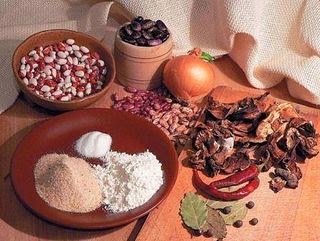 |
| People ate much less meat in the past, before mass production of food started. |
As I said in my earlier post I always liked to explore history of things. It's probably because I'm a historian. I was always interested on human diets during different history periods. On the first sight it looks like it's not it all hard to find out how people were feeding themselves for example 300 years ago. Of course it is, especially considering that the average peasant only 150 years ago was usually illiterate, so he/she wasn't writing down recipes, or reading it from cook books or magazines. Recipes from the past that we can read in some early cook books are usually recipes used to prepare food for nobility and we all know they didn't work much and their dietary habits were more guided by their hedonistic urges then by food that will make them healthier. They were rich and fat, and they didn't give much of a fuck about it (also rules of attractiveness, and medicine was quite different at that time).
Closest source from which i could find out what ordinary peasants (because Serbia was always predominantly peasant country) from Serbia were eating, were stories that my dad was telling me since I was a kid. He was born on 1953., beginning of a modern day era in Yugoslavia you could say, he lived in years of mass migrations from country side to industrial cities, beginning of mass production of food, and meat crave that struck Balkans as no other region in the world. His thoughts about his childhood are somehow idyllic, but food that he mentions from that time is completely different then what we imagine peasant people ate back than.
When Serbian people think about village food, especially village food from northern parts of Serbia (Vojvodina), first thing they think about are different meat products: home made bacon, prosciutto and stuff like that. Truth is, yes people ate all those a lot. Once a year they slaughtered a pig which fed the all family for the all year time. In my fathers words, those meat delicacies people eat only outside the house. They eat it usually in the fields, when they go to work. That was a hard food which was saved for days of hard labor. Even bacon, Serbs like to eat bacon raw, they don't fry it together with eggs as much as English people do. Although Serbian bacon is different, it's much closer to Italian pancetta, it's much more smoked and dry. Prosciutto was eaten on the field as well, or it was served as a meze when some guests came. It was accompanied with rakia, Serbian national drink. It was a food for special occasions, not a thing you eat every day in sandwiches. Today when we work in offices and cubicals, not only we don't need bacon, prosciutto and stuff like that, it actually makes us fat and unhealthy.
 |
| Hard work-hard food |
Lunch was cooked for the whole family. It was usually cooked in a big pot. It was the most important meal, when all family gets together (accept in some periods of the year when everybody was in the fields for the whole day). It was usually some of Serbian dishes like: beans stew, cabbage stew, green peas stew, green beans stew, stuffed peppers, potato stew etc.
 |
| In stew-like dishes every plate got one or few bits of meat |
Dinner was light. Sometimes even simmilar to breakfast, palenta with milk and sugar, bread, jam and milk, popara (usual dish in poor Serbian peasant homes, basiclly steamed bread with cheese), bread and milk, sutlijaš (dessert that originate from Otoman Empire, rice pudding with milk and cinnamon) etc.
Only real meat day with roast or rinflajš (cooked beef or chicken eaten with cooked vegetables and sauce) was Sunday, or the day when some guests drop by.
It's important to know that my dad grew up in communist times. So back then influence of Serbian Orthodox Church was very weak. Orthodox Christian faith also deals a lot with people's eating habits. So Orthodox people have few periods of the year they call fast (or lent). During those periods or specific days they don't eat meat (accept fish), milk or eggs. Basically they become fish eating vegans for some periods of the year, when you put those days all together there are around 250 fasting days in one year. So more then half of the year Orthodox people are vegans (who eat fish). Before WW2, these rules were common even in lives of regular people. Later only really faithful people, monks, nuns etc continued with these healthy habits.
To sum it up, Serbian people were almost vegan for 2/3 of the whole year, and on those other days they ate roast only on Sunday, Christmas and other holidays and on the days some guests came by, and on regular days they ate like one piece of meat a day. And we all think we can't live without meat?! We can't sit around in our offices, pressing buttons without burgers and steaks?!

No comments:
Post a Comment